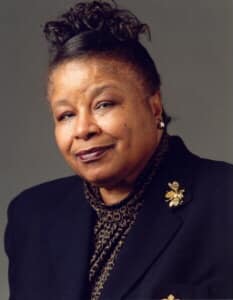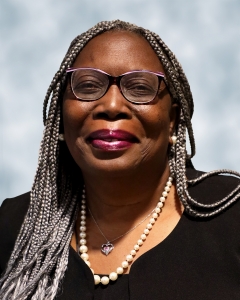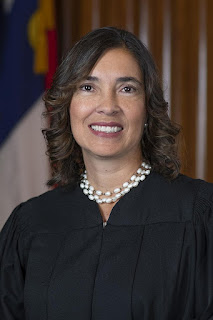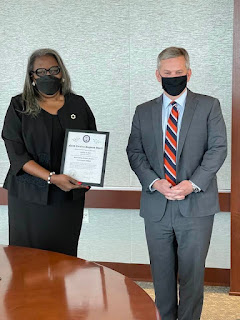WHY DID CHESLIE KRYST,
2019 MISS N.C./MISS USA,
DIE BY SUICIDE?
By Cash Michaels
Contributing writer
Why would a young, successful African-American woman who had achieved so much, and was positioned to accomplish even more, reportedly throw herself off from a New York City high-rise apartment building to end her life so soon?
That is the question being asked in the wake of the tragic, and yes, shocking death by suicide of Charlotte attorney Cheslie Kryst last Sunday. Published reports say that Kryst, who was crowned Miss North Carolina and Miss USA in 2019, was found dead on the sidewalk in front of the Orion Building in Manhattan where she lived, Sunday morning.
Saying that she jumped from the ninth floor, NYC police have ruled her death a suicide.
Cheslie Kryst was just 30 years old.
On the heels of the unfortunate suicide of actress/director Regina King’s 26 year old son, Ian Alexander, Jr., Cheslie Kryst’s tragic death was mourned by many on social media.
“Heartbreaking loss,” posted Renee from Charlotte on Facebook, one of many. “Prayers for GOD’s comfort to family and friends.”
Hours before her death, Ms. Kryst posted a sullen photo of herself with the words, “May this day bring you rest and peace.”
At first blush, Cheslie Kryst seemed to have it all, and was on track to have even more. But there were deep tears underneath all of her successes.
In March 2021, she authored an essay in Allure magazine titled, ‘ A Pageant Queen Reflects on Turning 30,” where, in the very first line she wrote, “Each time I say “I’m turning 30,” I cringe a little. Sometimes I can successfully mask this uncomfortable response with excitement; other times, my enthusiasm feels hollow, like bad acting. Society has never been kind to those growing old, especially women. (Occasional exceptions are made for some of the rich and a few of the famous.) When I was crowned Miss USA 2019 at 28 years old, I was the oldest woman in history to win the title…A grinning, crinkly-eyed glance at my achievements thus far makes me giddy about laying the groundwork for more, but turning 30 feels like a cold reminder that I’m running out of time to matter in society’s eyes — and it’s infuriating.
Beyond being a Charlotte attorney, former Miss North Carolina and Miss USA, Cheslie Kryst was also a social activist, and an Emmy Award nominated correspondent for the television magazine show Extra.
Kryst was born in 1991 in Jackson, Michigan, attended high school in South Carolina and graduated cum laude from the University of Carolina.
According to a NC Bar Association blog entry in 2019 titled, Members in Focus: Cheslie Kryst Knows the Beauty of Persistence, Kryst actually lost at her first attempt to win Miss North Carolina with the Miss America organization in 2014.
She fell short again in 2015.
By that time, she had aged out of competition for Miss America, so she decided to go for Miss USA. In 2016, Kryst was crowned fourth runner -up for Miss North Carolina.
Came back in 2017 and nothing…not even a swimsuit award which she nailed three times before.
2017 was also the year that she graduated from Wake Forest University School of Law, earning a law degree, an MBA and winning a national student trial advocacy competition. Kryst had also passed the North Carolina Bar, and was hired as an associate at Poyner Spruill in Charlotte.
She had also started a fashion blog, White Collar Glam, in her spare time.
But winning a top crown was still Kryst’s dream…something her mother, April Simpkins, a former Mrs. North Carolina, accomplished in 2002.
With one year to go before she aged out of the Miss USA Organization, Cheslie Kryst went out for the 2019 Miss North Carolina crown, and then Miss USA, both of which she won.
Kryst used her reign to focus on a plethora of social problems and community projects.
Still, two years after the fact, Cheslie Kryst was in pursuit of a personal happiness that seemed to allude her, until her untimely death Sunday.
“I discovered that the world’s most important question, especially when asked repeatedly and answered frankly, is: why?,” Cheslie Kryst wrote in her March 2021 Allure essay.Why earn more achievements just to collect another win? Why pursue another plaque or medal or line item on my resume if it’s for vanity’s sake, rather than out of passion? Why work so hard to capture the dreams I’ve been taught by society to want when I continue to only find emptiness?
Some saw the underlying warning in Ms. Kryst’s death - that there are those among us who are suffering mentally and emotionally more than others, despite their outward appearance, who need help.
“Check in on your friends, family and neighbors,” wrote Yvonne Lewis Holley, former NC House member on Facebook. “Your call, smile and love today could save a life.”
Editor’s note - if you or a loved one are struggling with mental health issues, call (888)331-3881 to learn more about best treatment options.
-30-
CAROLYN Q. COLEMAN,
NC NAACP FIRST V.P., CIVIL
ACTIVIST, DIES AT 79
By Cash Michaels
Contributing writer
“This state has lost a champion for the people. She left her imprint for justice on this state and country,” NC NAACP President Deborah Dicks Maxwell said last week upon news of the death of Ms. Carolyn Q. Coleman - First Vice President NC NAACP, National NAACP Board of Directors, Guilford County Commissioner and member of Delta Sigma Theta Sorority, Inc.
“On her shoulders I ascended to my current position, and while she is not here, I remain committed to the task at hand.”
Ms. Dicks-Maxwell, the first female ever to lead the NC NAACP, concluded her tribute to Ms Coleman with, “She was my shero and mentor.”
Indeed, many a female member of the NC NAACP are saying likewise about Carolyn Quilloin Coleman of Greensboro, who died January 26 at age 79.
“The NAACP feels the loss of one of it’s most dedicated activists and advocates,” the veteran civil rights organization said in a statement on it’s website last week. “ she is missed dearly by the communities she served. Our thoughts and prayers are with her family, friends, and loved ones during this time.”
A life steeped in standing up for human and civil rights, the Savannah, Georgia native was one of the first of three black students arrested while protesting racial segregation there. That led to a personal and professional commitment to public service via the NAACP for over 28 years where Coleman rose through the ranks to become a regional youth director, field director, Alabama state director, and later a member of the Board of Directors.
“You can depend on Carolyn Coleman,” her friend, Congresswoman Alma Adams (D-NC-12) of Charlotte, once said in an NC NAACP video tribute to Ms. Coleman. Rep. Adams went on to recall when both women were arrested by Greensboro police many years ago during a public protest, were handcuffed, and taken to jail.
“Carolyn was the most sincere human rights person I’ve ever met,” the late Andrea Harris, cofounder of the N.C. Institute of Minority Economic Development, once said. “It’s just who she is. She doesn’t know she’s fighting when she’s fighting.”
Coleman also served as a special assistant to N.C. Governor James B. Hunt on Minority Affairs, and later as a Guilford County commissioner where she served for twenty years since 2002, ultimately becoming that body’s first Black female chairwoman in it’s history.
“I’ve learned over my career as a public servant that government is only as good as the people who run it,” Ms. Coleman once said during a Guilford County commissioners meeting.
“We need leaders with the values and courage to do what it takes to make government work for the people it’s supposed to serve.”
“Not once in her remarkable life, did she slow down in her advocacy and commitment to supporting equity, inclusion and tolerance,” current Chairman Melvin “Skip” Alston said in a Guilford County press release about his longtime friend and colleague.
Gov. Hunt once called Carolyn Coleman “a wonderful leader” with ‘the qualities you want see in a good person.”
Ms. Coleman is survived by her son, Carlton.
-30-
NC ASSOCIATE JUSTICR ANITA EARLS
POLITICAL DRAMA SURROUNDS
NC SUPREME COURT JUSTICE EARLS
By Cash Michaels
Contributing writer
NC Associate Justice Anita Earls, who will turn 62 later this month, finds herself the center of political attention and drama this week both here in North Carolina, and in the nation’s Capitol.
Justice Earls is reportedly on a touted “short list” to become Pres. Joe Biden’s first Black female nominee to the U.S. Supreme Court, taking the seat of the retiring U.S. Associate Justice Stephen Breyer.
The White House has not formally confirmed that Earls is being considered.
Beyond that speculation, Earls is also one of the four Democrats who lead the 4-3 NC. Supreme Court majority, and finds herself under partisan Republican attack because she is considering the legality of a new GOP redistricting map that critics charge is “extreme partisan gerrymandering” that dilutes Black voting strength, costing several incumbent African-American lawmakers their seats if ratified.
The NC NAACP, a plaintiff in one of the consolidated lawsuits against the voting map, filed an amicus brief Monday stating, "The Congressional and Legislative maps enacted in 2021 by the North Carolina General Assembly on their face rise to the level of depriving Black voters in North Carolina of the constitutionally protected right to vote on equal terms as non-Black voters – a right the North Carolina NAACP has fought for valiantly for more than 80 years"
A three-judge lower Superior Court panel approved the map several weeks ago. The state’s High Court began hearing oral arguments Wednesday. Gov. Roy Cooper has vetoed a Republican attempt to extend the date for primary elections from May 17 to June 7 in case Justice Earls and the other three Democrats on the High Court rule against the map.
Republican state senators and the conservative press began pouncing on Earls weeks ago in hopes that she would recuse herself from hearing the case because as a civil rights attorney prior to being elected to the bench, Earls successfully fought against previous GOP racial and partisan gerrymandering maps. The GOP has even filed court motions to get her off now.
Earls legally took a $250,000 donation for her 2018 campaign for the NC Supreme Court from the National Democratic Redistricting Committee, which is led by former U.S. attorney general Eric Holder.
“Buying judgeships so partisan activists can use the power of the court to get desired political outcomes destroys the legitimacy of the judiciary,” wrote Sen. Amy Galey (R- Alamance) in a recent scurrilous press release.
In a subsequent release, Galey wrote. “Justice Earls’ conflicts are obvious and egregious. Imagine the outcry if, say, an oil company gave six figures to elect a judge and then brought a suit to overturn environmental regulations before that same judge.
Sen. Galey neglected, however, to note the alleged conflict of interest of Republican NC Associate Justice Phil Berger Jr. who is the son of Republican NC Senate Majority leader Phil Berger, who led passage of the redistricting map under review.
If Justice Earls felt the pressure and took herself off from considering the case, that would reduce the voting justices to 3-3, thus allowing the lower Superior Court panel ruling to stand in case of a party line tie vote.
If Justice Berger Jr. recused, the number would drop to 3-2, maintaining a Democratic court majority, and dooming the map.
Needless to say, neither Earls nor Berger Jr. has given any indication that they’re going anywhere.
To add insult to injury, Republican legislative leaders have floated a veiled threat to impeach Justice Earls in the conservative press.
A Raleigh News and Observer editorial stated, “That Republican lawmakers want to unfairly skew elections isn’t a surprise. But their campaign to bully a justice before a verdict or even a hearing is unexpected and disgraceful.”
For her part, Justice Earls has ignored the Republican threats, but did say she was ’honored’ to be on a recognized short list to fill the U.S. Supreme Court vacancy.
Observers say that given Justice Earls' competition, she is a long shot, at best.
-30-
STATE NEWS BRIEFS FOR 02-03-22
WILMINGTON FREE BLACK HISTORY MOVIE NIGHTS
[WILMINGTON] Every Friday night in February at 5:30 p.m., the Wilmington Parks and Recreation Dept will host a free family movie night in the MLK Center at 401 South Eight Street, with free popcorn. Kids under 14 must be accompanied by an adult, and everyone must pre-register online at the Wilmington Parks and Rec. website.
This Friday, February 4th is Black Panther (PG-13)
Friday, Feb. 11 is Radio (PG)
Friday , Feb. 18 is Corrina, Corrina (PG)
And Friday, Feb. 25 is Ruby Bridges (PG)
ROBINSON RAISES $1.5 MILLION FOR 2024 GOVERNOR’S RUN
[RALEIGH] Republican Lt. Gov. Mark Robinson reportedly has raised $1.5 million for his 2024 camping for governor, published reports say. The black conservative firebrand, known for his advocacy for gun rights, and opposition to gay people and the teaching of Black History in public schools, has done everything but formally announce that he’s running for governor. In a message to his supporters, Robinson promised to “…keep kicking them in the teeth,” referring to his critics. Robinson professes to be a good Christian.
DICKS-MAXWELL RECEIVES THE DOGWOOD AWARD
[WILMINGTON] During his recent visit to the Port City, state Attorney General Josh Stein took time out to honor NC NAACP President Deborah Dicks-Maxwell with the Dogwood Award for 2021. “My life has been spent working for the people of North Carolina, or wherever I reside,” said Maxwell. “So it’s always gratifying, it doesn’t have to be, to be recognized. Because whether I’m recognized or not, I’m going to continue working for the people,” the former NHC NAACP president said. The Dogwood Award recognizes those in communities across North Carolina who have done exceptional work to keep those communities strong.
-30-
NC NAACP PRES. DEBORAH DICKS-MAXWELL RECEIVING THE








